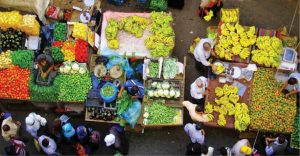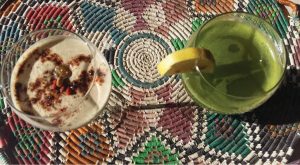Nutrition and people’s health in Palestine have changed tremendously over the last few decades due to changing political and economic conditions in the region, the increased access to and use of technology, and the advent (or should we say infiltration) of globalization. The traditional lifestyle of walking, growing one’s own food, and preparing household meals from basic, fresh ingredients has been replaced by a fast-paced lifestyle that demands ready-to-eat fast food and door-to-door transportation. Economic commitments and responsibilities have risen, demanding longer working hours so one can tend to the various expectations and demands of “modern life.” Nowadays few have time to care for their nutrition, grow their own produce, prepare a meal, or engage in mindful eating and enjoy the taste of their food. These lifestyle changes and shifting nutrition-related habits have greatly impacted our health, which is why intentional, daily choices to integrate healthy measures will have a significant, positive effect on health, according to recent findings in nutritional science.
Globalization has further contributed to the change in the nutrition and health of Palestinian citizens. As we have more options − no matter whether the motivation is curiosity-driven, popular trend-driven, or otherwise − Palestinians are trying many new, imported food products and/or processed foods that are inspired by Western trends and modern culture. And as these products have infiltrated the Palestinian kitchen, they have modified the nutrition of the Palestinian individual who now consumes more processed food and more sugar, meat, caffeine, etc. One cannot but wonder about the correlation of this trend with the increased rates of certain physical ailments and diseases that can be observed in Palestine.

According to the National Nutrition Surveillance System (NNSS) published by the Nutrition Department of the Palestinian Ministry of Health, the top two nutrition-related health conditions in the West Bank and Gaza are iron-deficiency anemia and type 2 diabetes. Iron-deficiency anemia can be caused by a low intake of iron-containing food sources such as meat, chicken, fish, spinach, lentils, etc., or by improper food combinations. Drinking lots of coffee, for example, or drinking it with breakfast compromises the absorption of iron, and this habit may contribute to the increasing rate of iron deficiency in the West Bank and Gaza population. Type 2 diabetes can safely be correlated with the increasing overweight rates in the West Bank and Gaza (according to the NNSS) and the increased sugar intake, whether it is consumed as white sugar or as an ingredient in a processed food product. The increased overweight rate could be a byproduct of a sedentary lifestyle accompanied by the increased stress levels prevalent in Palestine under occupation that may lead to emotional eating. The sedentary lifestyle is caused by the increased use of vehicles to commute, replacing the traditional trend to walk; sitting for long hours at work; and/or technology-based activities for adults and children that are taking the place of interactive and physical activities. Lower physical activity can be associated with higher risks of diseases, according to many studies.
Becoming aware of our nutrition and lifestyle habits and making conscious choices regarding them is a first step on the path to a person’s overall well-being.
Nutrition habits have also recently shifted. Many children in Palestinian communities can be seen buying chocolates, candies, and junk food on a daily basis, whereas teenagers and youth drink energy drinks excessively, households are becoming dependent on canned food instead of fresh produce, leaning towards more ready meals. All of this means that less nutritious food is consumed, e.g., fewer vitamins and minerals are provided, which means less fuel that would support the various body organs or allow them to operate optimally, leading possibly to compromised health.

Amongst such changes with regards to nutrition, lifestyle, and habits, some initiatives have started to pop up in Palestine with the intention of providing a more organic alternative to support a nutritious and health-minded lifestyle. It is a very recent trend to move back to simple, organic nutrition and healthy food preparation. Adherents of these trends eat organic produce and support organic farming (and agro-ecological farming). One example is Om Sleiman farm in Bilin, a community-supported farm that grows its produce by using the agro-ecological model of farming and sends a weekly basket of fresh produce to buyers during a season that lasts around nine weeks. Another example is Adel Fair Trade Nonprofit Organization that grows organic produce on its own farms close to Al-Zababdeh and sells it in various areas such as Ramallah, Bethlehem, and others. Adel holds a weekly market that offers organic produce and local handmade foods (to support women in villages and various communities) in each area and has its own store in Qalandia. Another example is Mashjar Juthour, an arboretum in Ein Qinya that displays a collection of local trees of Palestinian origins and provides space for visitors to get to know about these trees. Mashjar Juthour also offers educational or recreational workshops and events for families to promote the interaction between family members and nature in order to foster a healthier lifestyle with some time to de-stress.
The most common nutrition-related health disorders within the Palestinian population in the West Bank and Gaza are iron-deficiency anemia and diabetes, according to the National Nutrition Surveillance System of the Nutrition Department of the Palestinian Ministry of Health.
The healthy habits that an individual in Palestine can integrate to promote a healthier life include buying more organic produce, eating more fresh foods, such as fruits and vegetables, every day, drinking more water, being more physically active, eating foods that are in season, preparing more homemade meals, making healthier choices when ordering food from restaurants, and last but not least, enjoying one’s meal and making healthy choices and a commitment to one’s daily nutrition. Everyone is encouraged to maintain a clean and healthy place of residence, stocking the kitchen with nutritious foods and keeping out the junk. Other suggestions include connecting with local sources of organic produce, cooking healthy seasonal meals, connecting to wellness groups, and seeking out more resources and activities, among many others.
Health can be greatly affected by one’s daily nutrition. Providing the essential minerals, vitamins, and nutrients for the body (which can be found most abundantly in fresh foods or unprocessed natural foods) enhances or even enables optimal use and supports each body organ in its various functions. Thus, making healthy daily choices and decisions concerning nutrition and lifestyle can make all the difference in individual and collective health.
Tala Khoury holds a bachelor’s degree in nutrition and dietetics from the American University of Beirut, Lebanon. She has worked with the World Health Organization and the Department of Nutrition of the Palestinian Ministry of Health, and has been a nutrition consultant for the Jerusalem Pharmaceuticals company employees. Subsequently, she pursued a Canadian certification in holistic nutrition (nutrition and health of mind, body, and soul), and specialized in detox, nutrition for cancer. Tala works as a nutrition consultant, wellness coach, and Reiki practitioner in her clinic “Taqa Wellness” and teaches a well-being course at Khadouri University.


